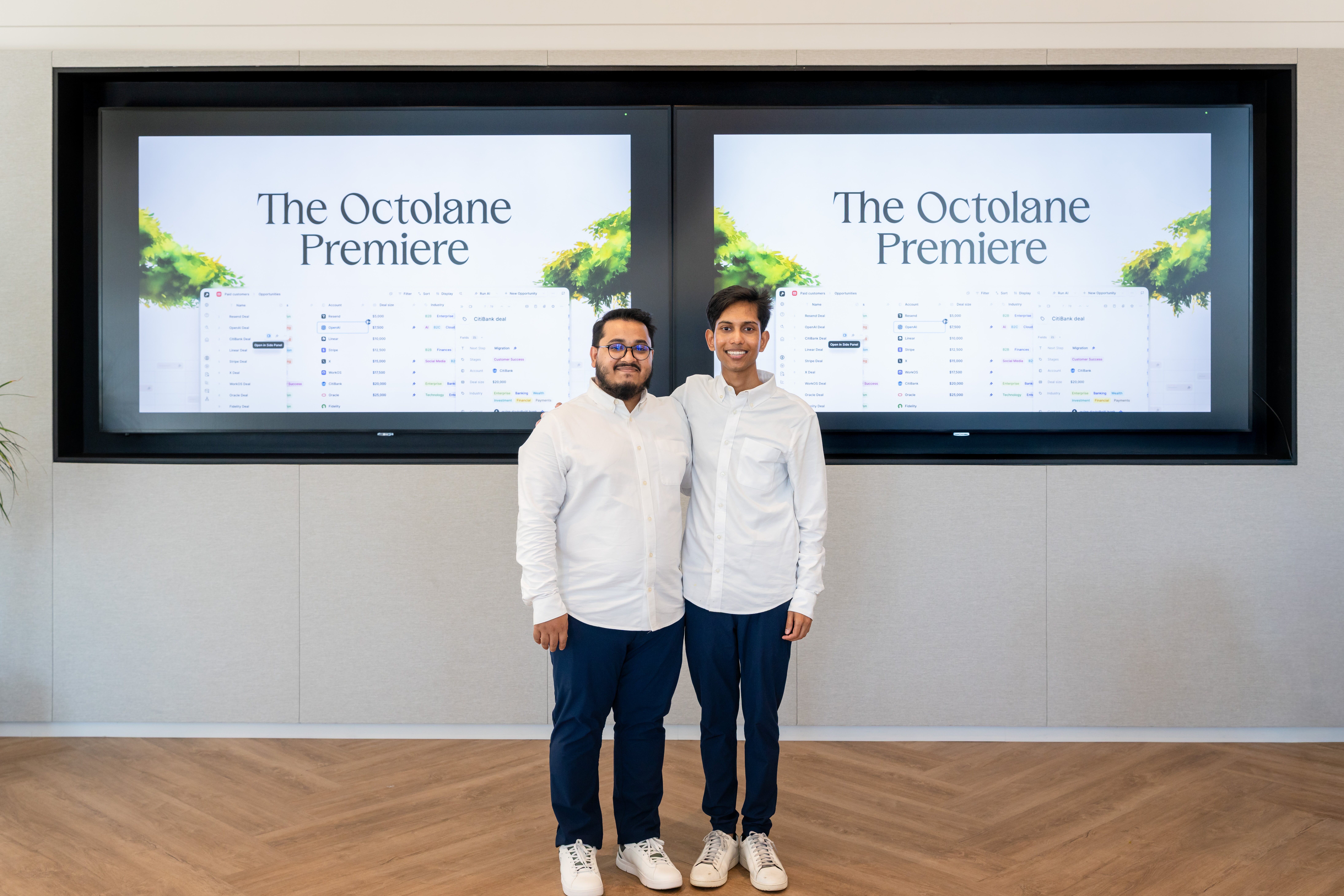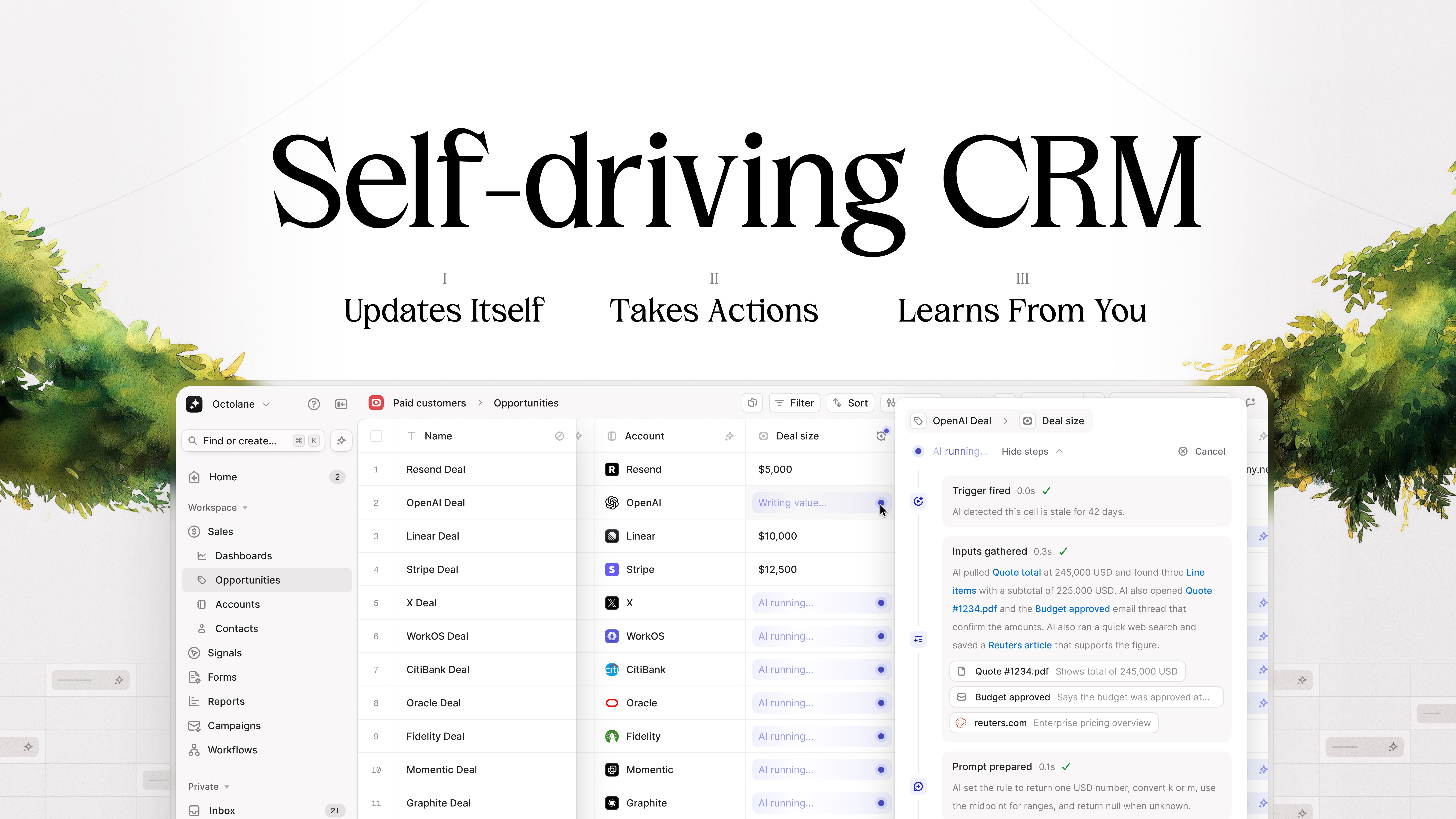The Self-Driving CRM: Inside One Chowdhury's Journey Building AI-Native CRM Octolane

The CRM landscape has remained largely unchanged for years, with industry leaders Salesforce, Adobe, and Hubspot owning 32.9% of the market. But while many corners of the SaaS ecosystem have innovated in recent years, legacy CRMs still force sales teams to complete countless manual tasks and offer limited automation.
When precocious sales engineer One Chowdhury learned about legacy CRM’s limitations, he knew it would be possible to build a better solution. So he teamed up with co-founder Md Abdul Halim Rafi to create a CRM for the AI-first world.
Introducing Octolane: The Self-Driving CRM
Octolane is an AI-native CRM that saves users’ time by updating itself, taking action, and adapting to users’ behavior.
Unlike traditional CRMs that require manual data entry, Octolane automatically scans emails, meeting transcripts, and form submissions to create opportunities and update records. It can also use this data to take action, drafting follow-up emails, scheduling meetings, and executing next steps so that reps don’t have to. As users engage with the platform, Octolane learns and adapts, allowing it to become a "compounding asset" that gets more powerful as a team continues to use it.

Having grown from two co-founders with a vision to a team of five, Octolane is already serving over 200 customers. And they’re just getting started.
One’s Journey to Octolane
Two years before dropping out of college to start Octolane, One didn’t even know what a CRM was.
While studying Computer Science at Duke, he built a program that automatically generated documentation from codebases using LLMs as part of a hackathon. On the other side of the country, the founders of intelligent documentation platform Mintify saw One’s work, and immediately offered him a summer internship.
One accepted the offer and upon arriving in San Francisco, was given the freedom to design and build products from scratch. “They didn't treat me like an intern,” he explains. “Han and Hahnbee gave me complete autonomy—full freedom to build whatever I thought was right. They trusted me to make decisions and run with ideas from day one.”
Working alongside the Mintify team out of a co-working space in San Francisco’s Mission District, One also had the opportunity to build a network with other founders and engineers, understand more about their workflows and the greater SaaS ecosystem. After learning more about Salesforce and other CRMs, One began to wonder how the company with the tallest building in San Francisco, the Salesforce one, could have a product that users hated. So alongside his work for Mintify, he began to explore new ways to approach CRM in the age of AI, incorporating feedback from others in his co-working space.
When his internship came to an end, One met with Han, Mintify’s CEO, for a performance review. When One asked whether he’d be able to return to intern again next summer, Han assured him that he’d always have a place at Mintify, but advised him to apply to YC with his AI CRM idea. One took Han's advice, applied to YC, and was accepted to start in YC's W24 cohort. He was accepted alongside his best friend from high school, Rafi, with whom he had learned to code by watching YouTube videos together.
After getting accepted to YC, One dropped out of Duke to move to San Francisco, and hasn’t looked back since. Eighteen months later, the team raised an oversubscribed $2.6M seed round and have onboarded hundreds of customers.
One’s Experience in San Francisco
One credits much of his initial success as a founder to the generosity of San Francisco’s tech community.
"The most striking thing has been how genuinely helpful the San Francisco tech community is. You hear negativity about it from the outside, but these are some of the most supportive people I've ever encountered. They show up for each other in ways I've never experienced anywhere else."
To learn more about One’s journey building Octolane, you can follow him on X or visit octolane.com.
Up to 3,500 bonus and 3% cash-back on all card spend [3], 6 months off payroll, and 50% off bookkeeping for 6 months, free R&D credit.
Frequently Asked Questions
- How do I sign up for Every?
You can get started right away—just click “Get Started” and follow a short onboarding flow. Prefer a little help? One of our specialists can walk you through incorporation, banking, payroll, accounting, or whatever you need.
- What features does Every offer?
Every gives startups a complete back office in one platform. From incorporation and banking to payroll, bookkeeping, and tax filings, we take care of the operational heavy lifting—so you can spend more time building, less time managing.
- How is Every different from other tools?
Most competitors give you software. Every gives you a full-stack finance and HR team—plus smart financial tools that actually benefit founders. Earn up to 4.3% interest on idle cash and get cash back on every purchase made with your Every debit cards, routed straight back to you.
Every is not a bank. Banking services provided by Thread Bank, Member FDIC. Your deposits qualify for up to $3,000,000 in FDIC insurance coverage when Thread Bank places them at program banks in its deposit sweep program. Pass-through insurance coverage is subject to conditions. The Every Visa Business Debit Card is issued by Thread Bank, Member FDIC, pursuant to a license from Visa U.S.A. Inc. and may be used anywhere Visa cards are accepted.
- Is my data secure with Every?
We use end-to-end encryption, SOC 2-compliant infrastructure, and rigorous access controls to ensure your data is safe. Security isn’t a feature—it’s foundational.
Can I switch to Every if my company is already set up?Yes—you can switch to Every at any time, even if your company is already incorporated and running. Whether you're using separate tools for banking, payroll, bookkeeping, or taxes, we’ll help you bring everything into one place. Our onboarding specialists will guide you through the process, make sure your data is transferred cleanly, and get you set up quickly—without disrupting your operations. Most founders are fully transitioned within a week.
- What stage of startup is Every best for?
Every is designed for startups from day zero through Series A and beyond. Whether you're just incorporating or already running payroll and managing expenses, we meet you where you are. Early-stage founders use Every to get up and running fast—with banking, payroll, bookkeeping, and taxes all handled from day one. Growing teams love how Every scales with them, replacing patchwork tools and manual work with a clean, unified system.
We’re especially valuable for teams who want to move fast without hiring a full finance or HR team—giving founders more time to build, and fewer distractions from admin and compliance
- How long does onboarding take?
Onboarding with Every is fast and efficient. For most startups, the process typically takes between 3 to 7 days, depending on your specific needs and how much setup you already have in place.
If you're a new company, you'll be up and running quickly—getting your banking, payroll, and bookkeeping set up without hassle. If you’re transitioning from another system, our specialists will help you migrate your data, ensuring a smooth switch with no gaps or errors in your operations.
We guide you every step of the way, from incorporation to setting up automated payroll to handling your taxes—so you can focus on growing your business. Our goal is to make sure you're fully operational and confident in your back office in under a week.
Practical Questions to Ask to Ensure Your Bank is Well Managed
How much liquidity does the bank have on hand to cover unexpected withdrawals or shortfalls?
What percentage of the bank's deposits are invested in longer-term securities and loans, and what percentage is kept as cash reserves?
How does the bank diversify its investment portfolio to minimize potential losses and reduce risks?













